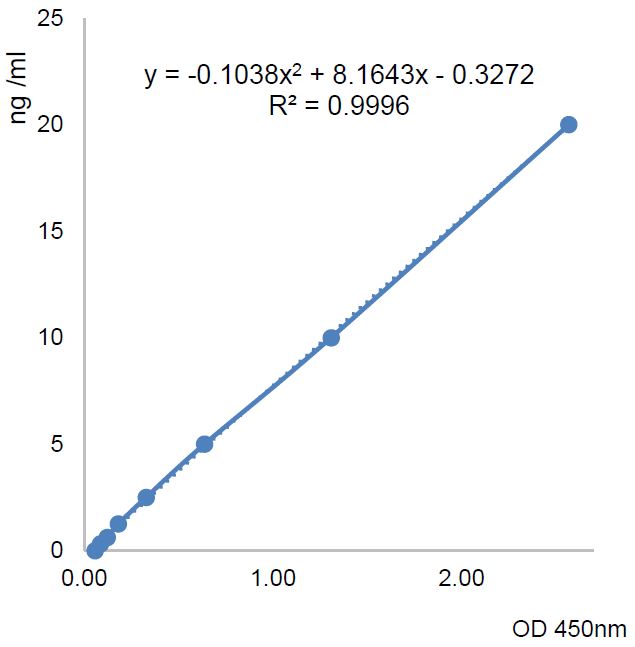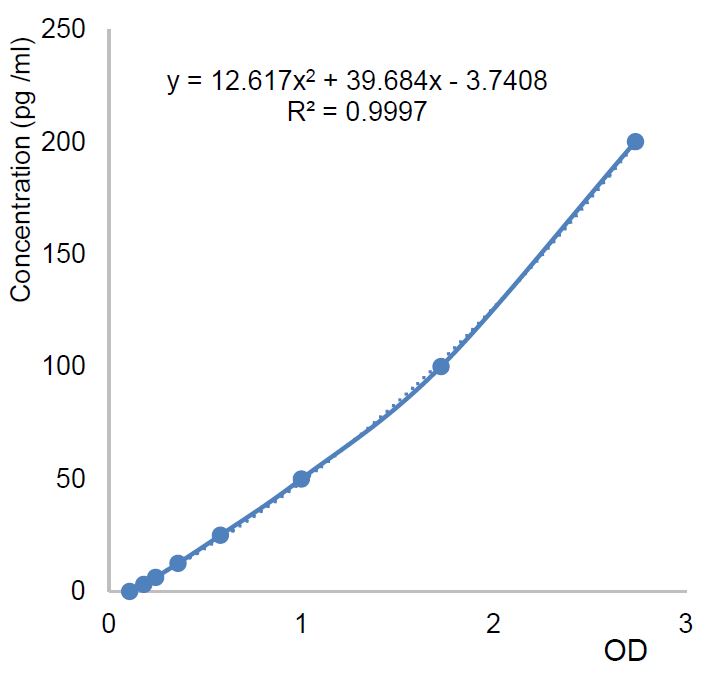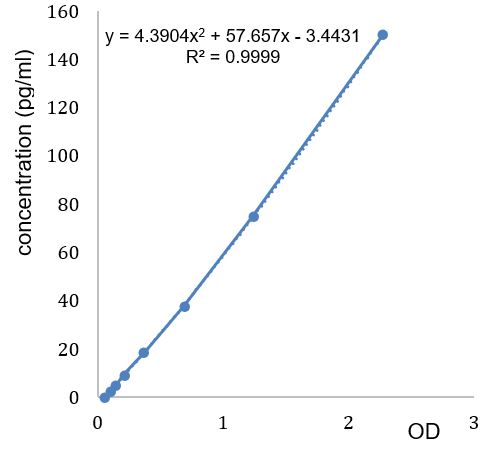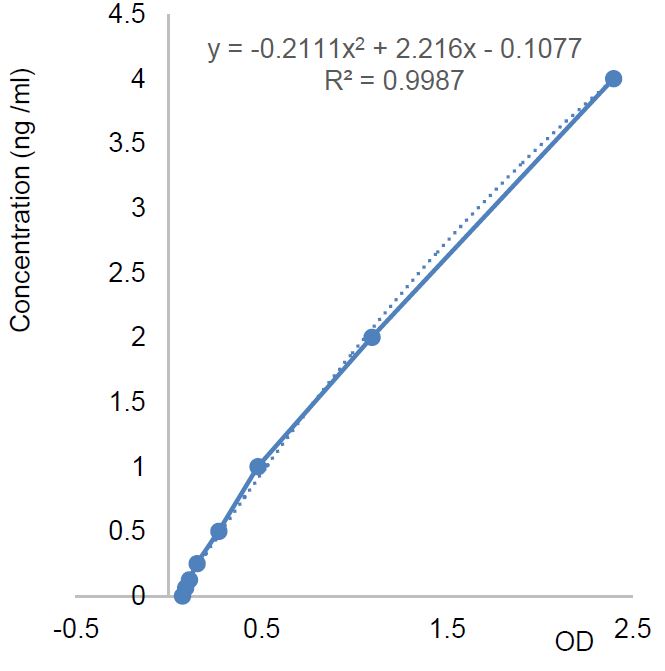Cookie Policy: This site uses cookies to improve your experience. You can find out more about our use of cookies in our Privacy Policy. By continuing to browse this site you agree to our use of cookies.
Immuno-Oncology Biomarker ELISA Kits
AdipoGen Life Sciences has 20 years experience in manufacturing specific and sensitive research ELISA kits. Using this expertise we have developed a set of highly sensitive ELISA Kits for key immuno-oncology biomarkers, including B7-H3, PD-1, PD-L1, ICOSL and CD40L. Our thouroughly validated ELISA Kits provide robust and reproducible results.
B7-H3 (CD276) (human) ELISA Kit
The B7-H3 (CD276) (human) ELISA Kit (Prod. No. AG-45B-0025) is a sandwich ELISA for specific quantitative determination of soluble human B7-H3 (CD276) in serum, plasma and cell culture supernatants. Soluble human B7-H3 (CD276) is ectopically expressed in various cancers. Its level in serum of patients with cancer suggests that it can be used as a noninvasive biomarker for diagnosis, prognosis and/or treatment response.
SELECTED REVIEWS: B7-H3 Immune Checkpoint Protein in Human Cancer: K. Flem-Karlsen, et al.; Curr. Med. Chem. 27, 4062 (2020) | The Role of CD276 in Cancers: S. Liu, et al.; Front. Oncol. 11, 654684 (2021)
| Product Name | PID | Sensitivity | Range | Samples |
| B7-H3 (CD276) (human) ELISA Kit | AG-45B-0025 | 0.3 ng/ml | 0.3125 - 20 ng/ml | Serum, Plasma, Cell Culture Supernatant |
PD-1 (CD279) (human) ELISA Kit
The PD-1 (CD279) (human) ELISA Kit (Prod. No. AG-45B-0015) is a sandwich ELISA for specific quantitative determination of human soluble PD-1 in serum, plasma and cell culture supernatants. Blockade of the PD-1/PD-L1 interaction enhances antitumor immunity. Soluble checkpoints, such as sPD-1 or sPD-L1, are involved in positive or negative immune regulation. Changes in their serum/plasma levels affect the development, prognosis and treatment of cancer. The PD-1 pathway plays a major role in the inhibition of self-reactive T cells and protection against autoimmune diseases. Elevated levels of soluble PD-1 (sPD-1) are shown in rheumatoid arthritis, skin sclerosis and autoimmune hepatitis.
SELECTED REVIEW: Soluble PD-1: Predictive, Prognostic, and Therapeutic Value for Cancer Immunotherapy: M. Khan, et al.; Front. Immunol. 11, 587460 (2020)
| Product Name | PID | Sensitivity | Range | Samples |
| PD-1 (CD279) (human) ELISA Kit | AG-45B-0015 | 1.6 pg/ml | 3.125 - 200pg/ml | Serum, Plasma, Cell Culture Supernatant |
PD-L1 (CD274) (human) ELISA Kit
The PD-L1 (CD274) (human) ELISA Kit (Prod. No. AG-45B-0016) is a sandwich ELISA for specific quantitative determination of human soluble PD-L1 in serum, plasma and cell culture supernatants. Blockade of the PD-1/PD-L1 interaction enhances antitumor immunity. The PD-1 pathway plays a major role in the inhibition of self-reactive T cells and in protection against autoimmune diseases. Soluble checkpoints, such as sPD-1 or sPD-L1, are involved in positive or negative immune regulation. Changes in their serum/plasma levels affect the development, prognosis and treatment of cancer. Levels of sPD-L1 are increased in the plasma of cancer patients as well as in cerebrospinal fluid of gliomas. sPD-L1 is a biomarker of poor survival in patients with B cell lymphoma, renal cell carcinoma, metastatic melanoma or lung cancer and is associated with advanced tumor stages.
SELECTED REVIEW: Non-cytomembrane PD-L1: an atypical target for cancer: H. Ying, et al.; Pharmacol. Res. 105741 (2021) (Review)
| Product Name | PID | Sensitivity | Range | Samples |
| PD-L1 (CD274) (human) ELISA Kit | AG-45B-0016 | 0.8 pg/ml | 2.34 - 150pg/ml | Serum, Plasma, Cell Culture Supernatant |
AdipoGen Life Sciences has 20 years experience in manufacturing specific and sensitive research ELISA kits. Using this expertise we have developed a set of highly sensitive ELISA Kits for key immuno-oncology biomarkers, including B7-H3, PD-1, PD-L1, ICOSL and CD40L. Our thouroughly validated ELISA Kits provide robust and reproducible results.
FGL1 (human) ELISA Kit
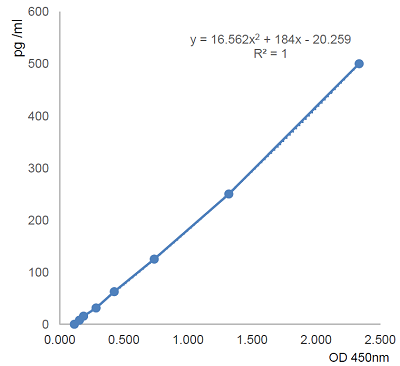
The FGL1 (human) ELISA Kit (Prod. No. AG-45B-0022) is a sandwich ELISA assay for specific quantitative determination of human FGL1 in serum, plasma and cell culture supernatant. FGL1-LAG-3 interaction blockade promotes tumor immunity by stimulating T cell expansion and activation. FGL1 is highly produced by human cancer cells, and elevated FGL1 in the plasma of cancer patients is associated with a poor prognosis and resistance to anti-PD-1/ B7-H1 therapy.
SELECTED REFERENCES: Fibrinogen-like protein 1 is a major immune inhibitory ligand of LAG-3: J. Wang, et al.; Cell 176, 334 (2019) | Fibrinogen-like protein 1 (FGL1): the next immune checkpoint target. W. Qian, et at.; J. Hematol. Oncol. 14, 147 (2021)
| Product Name | PID | Sensitivity | Range | Samples |
| FGL1 (human) ELISA Kit | AG-45B-0022 | 1.8 pg/ml | 7.8 - 500 pg/ml | Serum, Plasma, Cell Culture Supernatant |
ICOSL (B7-H2/CD275) (human) ELISA Kit
The ICOSL (B7-H2/CD275) (human) ELISA Kit (Prod. No. AG-45B-0017) is a sandwich ELISA for specific quantitative determination of soluble human ICOSL [B7-H2/CD275] in serum, plasma and cell culture supernatants. The ICOS/ICOSL pathway is necessary for the optimal therapeutic effect of anti-CTLA-4, thus implicating this pathway as a target for future combinatorial strategies to improve the efficacy of anti-CTLA-4 therapy. The soluble form of ICOSL (sICOSL), found in plasma and sera, can be a potential biomarker for autoimmune diseases and some cancers.
SELECTED REVIEW: The rationale behind targeting the ICOS-ICOS ligand costimulatory pathway in cancer immunotherapy: C. Solinas, et al.; ESMO Open 5, e000544 (2020)
| Product Name | PID | Sensitivity | Range | Samples |
| ICOSL (B7-H2/CD275) (human) ELISA Kit | AG-45B-0017 | 55 pg/ml | 0.0625 - 4 ng/ml | Serum, Plasma, Cell Culture Supernatant |
CD40L (human) ELISA Kit
The CD40L (human) ELISA Kit (Prod. No. AG-45B-0018) is a sandwich ELISA for specific quantitative determination of human soluble CD40L in serum, plasma and cell culture supernatants. CD40-CD40L interactions are crucially involved in the development of autoimmune disease and have an impact on growth regulation of certain carcinomas. Elevated levels of sCD40L have been observed in sera from patients with systemic lupus erythematosus (SLE), chronic lymphocytic leukemia (CLL) and unstable angina.
SELECTED REVIEW: CD40/CD40L Signaling as a Promising Therapeutic Target for the Treatment of Renal Disease: S. Zhang, et al.; J. Clin. Med. 9, 3653 (2020)
| Product Name | PID | Sensitivity | Range | Samples |
| CD40L (human) ELISA Kit | AG-45B-0018 | 20 pg/ml | 0.03125 - 2 ng/ml | Serum, Plasma, Cell Culture Supernatant |
Select Your Pathway of Interest & Discover High Quality Research Reagents
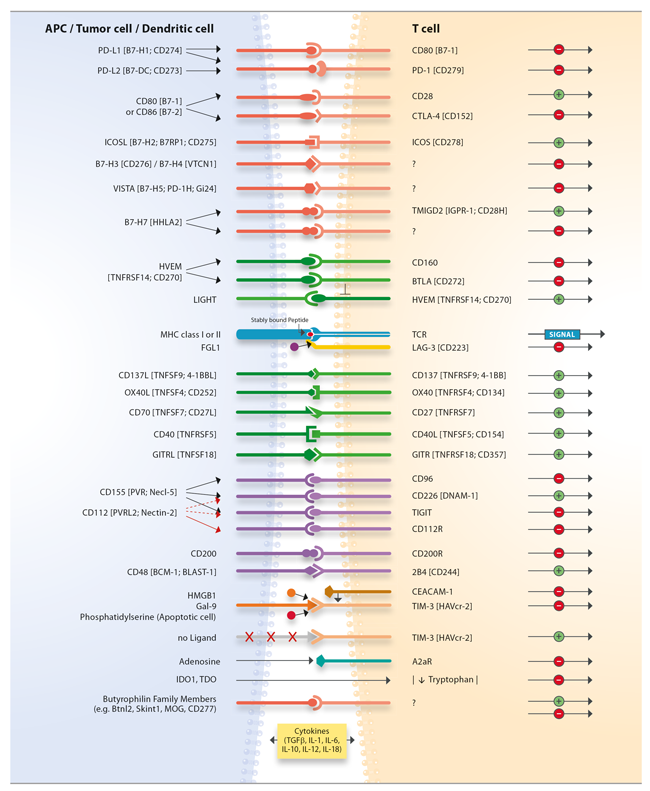
Regulation and activation of T lymphocytes depend on signaling by the T cell receptor (TCR) and also by cosignaling receptors that deliver negative or positive signals (see overview chart). The amplitude and quality of the immune response of T cells is controlled by an equilibrium between costimulatory and inhibitory signals called immune checkpoints. Under normal physiological conditions, immune checkpoints are crucial for the maintenance of self-tolerance and to protect tissues from damage during pathogenic infection. Manipulations of stimulatory or inhibitory immune checkpoints using monoclonal antibodies, soluble receptors (fusion proteins) or small molecules may provide therapeutic strategies for autoimmune diseases, tumor growth, infectious diseases and transplantation by decreasing or enhancing T cell activity. IHC-competent antibodies and highly sensitive immunoassays are of great importance for diagnostic and therapeutic control purposes.
Cancer immunotherapy (also called immuno-oncology) is an artificial stimulation of the immune system to treat cancer, improving on the system's natural ability to fight cancer. Immune checkpoints are regulators of the immune system that maintain immune homeostasis and prevent autoimmunity. Inhibitory checkpoint molecules, such as CTLA-4, PD-1, PD-L1 or LAG-3 are targets for cancer immunotherapy due to their potential of counteracting major tumor immune evasion mechanisms. AdipoGen Life Sciences offers a broad panel of immune checkpoint reagents, including recombinant proteins, antibodies and ELISA Kits.
Literature References:
1. The future of immune checkpoint therapy: P. Sharma & J.P. Allison; Science 348, 56 (2015)
2. Immune checkpoint blockade in infectious diseases: M.N. Wykes & S.R. Lewin; Nat. Rev. Immunol. 18, 91 (2018)
3. Fundamental Mechanisms of Immune Checkpoint Blockade Therapy: S.C. Wei, et al.; Cancer Discov. 8, 1069 (2018)
